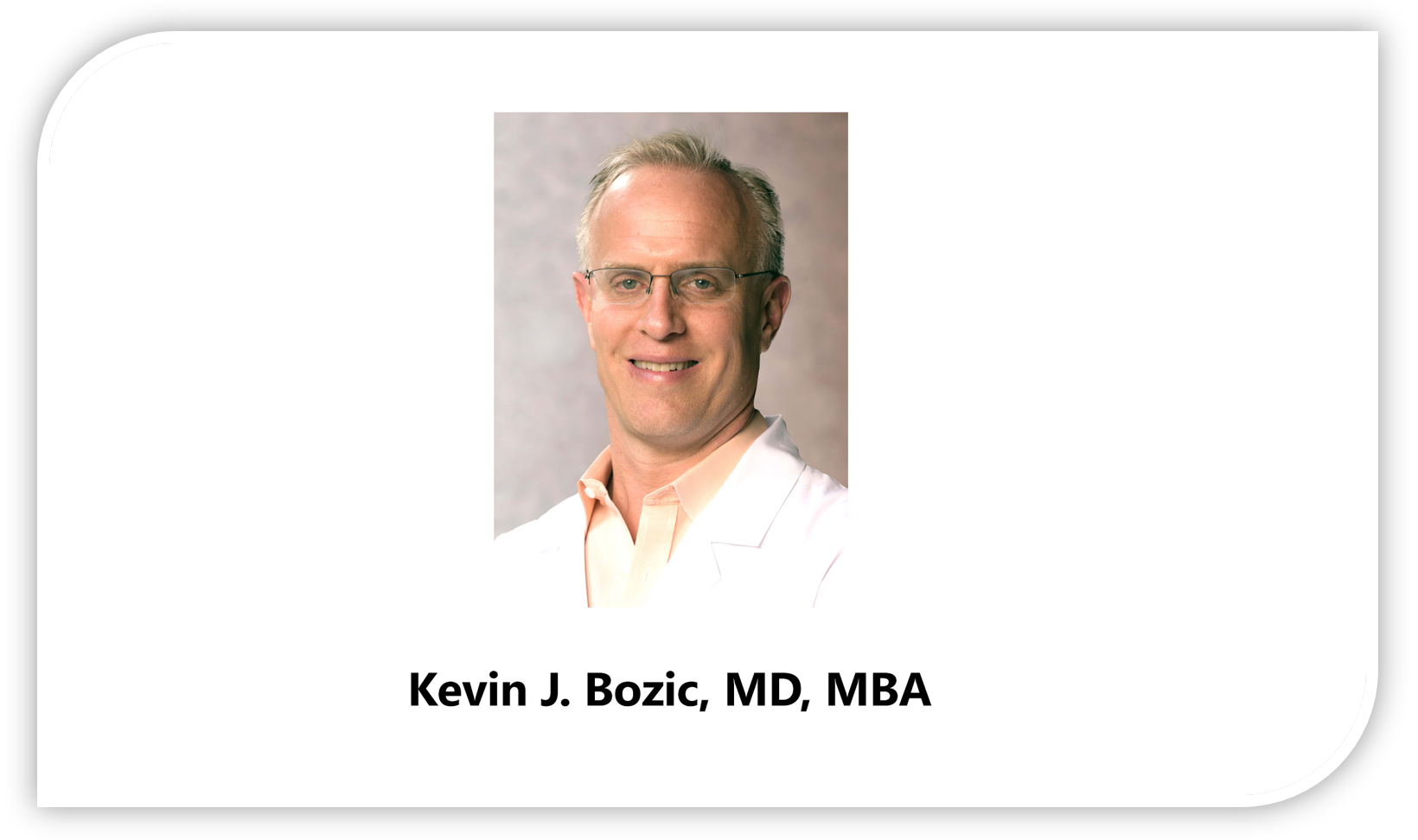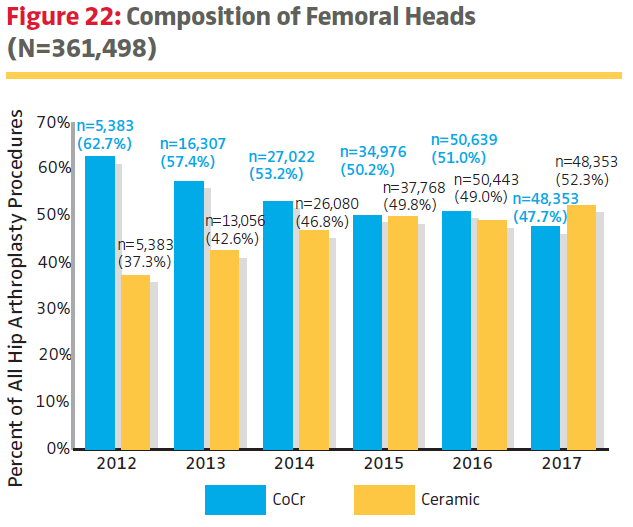Undergoing the Same Surgery He Performs Informed a Joint Surgeon's Practice

This blog concludes a two-part interview series on the personal experience of Kevin J. Bozic, MD, MBA, who underwent total knee arthroplasty. Both interviews originally appeared in AAOS Now (July and August 2019 issues, respectively) and were conducted by Meredith L. Grogan Moore, BS. The first blog posted on July 24 and the final blog is below.
The first installment in this series charted the story of how renowned joint replacement surgeon Kevin J. Bozic, MD, MBA, discovered his own need for total knee arthroplasty, his reaction to the news, and his input on his treatment course. In part two, Dr. Bozic discusses the recovery process, the impact of the experience on the care of his own patients, the relevance of patient-reported outcomes measures (PROMs), and what other providers can glean from this insider experience.
Ms. Moore: How did recovery deviate from what you expected?
Dr. Bozic: Overall, it was harder. I used a walker longer than I expected before transitioning to a cane. I remember a time when I had a big meeting scheduled that was maybe 10 days postoperatively. I thought, “I can go; it’s just a meeting.” But just getting there in a car, getting up the elevator, and then sitting for an hour and having to elevate my leg … it was a major ordeal that I didn’t appreciate. That hour-long meeting probably set me back a couple days.
It was also a lot more painful than I expected. I always tell my patients that the first night is easy because you still have all those drugs in you. The first day, I had the nerve block and the pericapsular injection and the spinal, and I thought, “I’m going to do this without opioids.” It was the second night when I went home, and I was so miserable. My wife finally told me, “Just take the medicine, and I’ll tell people you didn’t.” I actually had to get a refill on my opioid medication prescription. According to my surgeon, this was not the norm in his practice. I think of myself as having a high pain threshold, but obviously the procedure-related pain was worse than I anticipated.
Ms. Moore: How do you think having performed thousands of knee replacements changed your expectations about the postoperative process?
Dr. Bozic: I had become jaded to patients complaining about pain. If patients told me they continued to have pain during the six-week visit, I told them, “You’re fine; get on with your life. Your knee is better than it was before surgery.” I had pain past six weeks, and I wasn’t fully recovered or functional by that time, and the first three weeks I was pretty miserable. One thing I remember most was the disruption in sleep. I couldn’t sleep at night, so I never got more than an hour or two of sleep at a time, which went on for at least a month.
Ms. Moore: What else surprised you about the postoperative course?
Dr. Bozic: I totally underestimated what it was going to be like. I couldn’t even travel in a car across town two weeks after surgery. If I had stuck with my original surgery date, I had planned on getting on an airplane two weeks later, then getting on an airplane almost every week after that for two months, as well as going on a three-day golf trip. When I finally ended up having the surgery, there was a four- to six-week period before I had to get on an airplane, which is the longest I’ve ever not been on an airplane since residency, so it was good that I did the surgery when I did.
Ms. Moore: Was it hard for you to get off the opioids?
Dr. Bozic: I took them longer than I expected. I was in pain; I took them for about six to eight weeks but had expected to be on them for two weeks or less. Certainly, I felt like I couldn’t sleep without them for a good two months.
Ms. Moore: Has your experience altered the way you approach pain management for your patients?
Dr. Bozic: I now say, “You need to be in serious pain before you consider having knee replacement surgery; you wouldn’t do this for mild pain.” It’s not just the disutility that goes along with the surgery; after care and rehabilitation … the end result is not perfect.
Ms. Moore: You’ve had to strip the idealism, but you’re still happy you did it, correct?
Dr. Bozic: Oh yeah. The things that I can do now—I can walk a golf course, which I never would have been able to do before. My wife and I went hiking in Patagonia less than a year after surgery for eight to 10 hours a day in rugged terrain; there’s no way I could have done that previously. My lifestyle and capabilities have improved dramatically, but I still have pain at times—ironically, mostly when I’m sitting.
Ms. Moore: In what ways has your approach to pain shifted?
Dr. Bozic: I’m probably a little more empathetic. I really encourage my patients to take the pain medicine if they need it, but also to wean off of it as quickly as possible.
Ms. Moore: How has the tone or the nature of the preoperative visit with your patients changed?
Dr. Bozic: I try to set much more realistic expectations. I say, “This is going to be really hard; it’s going to be a lot harder than you think.” When a patient says, “I’ve got a trip to Argentina, and then I have to go here and there.” I say, “You might want to give it six weeks.” Before, I would say, “Ah yeah, after a couple weeks, you’ll be fine.”
Ms. Moore: Do you divulge to patients that you’ve had a total joint arthroplasty or just hope that they trust you?
Dr. Bozic: I do sometimes, but I hate when people tell me, “I’ve been through it; I know.” I try not to do it that way. I say, “I have had my knee replaced, but everyone’s experience is different; I can tell you that it was really hard for me.”
Ms. Moore: Do you feel any differently about your practice?
Dr. Bozic: Yeah. First of all, surgery is not to be taken lightly. It should be done as a last resort after none of the other treatments are working. Blocking out time after the surgery is more important than I thought. I used to tell patients they could go back to work in eight to 10 days, and now I’m a little more cautious. It has really hit home how these procedures are impacting the opioid crisis, because we put people on opioids, and then it’s hard for them to get off of them.
Ms. Moore: Did the experience of going through your knee replacement alter your view on the importance of PROMs?
Dr. Bozic: PROMs are extremely useful for me as a surgeon in discussing treatment plans and progress following surgery with my patients. My experience reinforced my opinion that they’re a really valuable tool to understand when surgery is appropriate. The first time I did a Knee Injury and Osteoarthritis Outcome Score, Junior (KOOS, JR.), I was in the 60s, and I knew I wasn’t ready for surgery; at that point, I hadn’t done any research to know what that meant—I just knew that I had a 60, and it wasn’t time. When I did it, my KOOS, JR. was 42, and I was ready.
Ms. Moore: At that point, you felt you had passed that appropriateness point?
Dr. Bozic: Yes. I’m a little unique in this regard, because I think PROMs are most important for appropriateness and secondarily for tracking outcomes.
Ms. Moore: You just took the KOOS, JR. again—one year and three months after surgery. Did your score of 65 fit with what you expected?
Dr. Bozic: I was hoping to do better. I’m better than I was before the surgery, but I’m not at the level I’d hoped for, and that’s consistent with what I feel.
Ms. Moore: Does knowing this number change anything going forward?
Dr. Bozic: I think it will affect how I deal with patients and setting realistic expectations. I think it will motivate me to keep working to get the leg stronger and trying to improve.
Ms. Moore: What’s your impression of the stability of this score? How often would you be interested in retaking the KOOS, JR.?
Dr. Bozic: That’s a good question, because I feel like the evidence shows that most people peak at a year after surgery, and then their scores start to decline. I would want to do it again in three years and hope that my score will be better.
Ms. Moore: If you could counsel preoperative you, what would you tell him?
Dr. Bozic: Take it seriously; give yourself the time to recover. You’re mortal; you’re human. Appreciate that the people around you are helping you get through it.
Conclusion
For a seasoned adult reconstructive surgeon, undergoing the very procedure he performs offered takeaways only evident after the physician-turned-patient experience.
Dell Medical School is planning a qualitative study. If you have been through a similar experience of undergoing arthroplasty after or during a career in adult reconstruction, please contact lauren.uhler@austin.utexas.edu.
Meredith L. Grogan Moore, BS, is a 2018–2019 value-based care fellow in the Department of Surgery and Perioperative Care at Dell Medical School at the University of Texas at Austin.
For information about the AAOS RegistryInsights platform, speak with a Registry Engagement Associate at (847) 292-0530 or Request A Demo today!
Be sure to leave a comment in the form below!



